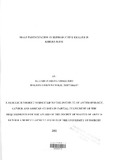| dc.description.abstract | Immediately after the International Conference on Population and Development (ICPD) in Cairo,
most countries (Kenya included) embarked on the process of domesticating the ICPD
Programme of Action. In Kenya, this process culminated in the development of a policy
document titled, The National Population Policy for Sustainable Development, which was
approved by Parliament as a Sessional paper No. I of 2000.
Though the government of Kenya, in her National Reproductive Health Strategy developed in
1996, had prioritized, Provision of Comprehensive and integrated system of reproductive health
care and services" these services have not been fully realized by all because; most men remain
passive participants on reproductive health issues. This study therefore, set out to establ ish the
level of male participation in reproductive health in Kibera.
A total of 35 men, currently married or in intimate relationship, and living in Kibera were
interviewed through survey questionnaire on their knowledge, level of participation and what
they considered as obstacles to male participation in reproductive health. Women participated
through focused group discussions, a total of three focused group discussions were organized and
attended by 20 women, drawn from organized women groups in Kibera. Key informants
provided information that further enriched the data collected from the survey and focused group
discussions.
The study found that most men are knowledgeable orr contraceptives and reproductive health
issues, as all were able to name at least one contraceptive method. The most widely known
contraceptive by men is condom; ho.wever, this knowledge is not necessarily translated into
practice, especially with their wives/regular girlfriends. The level of knowledge is influenced by
among other factors, the level of education and access to information. The level of male
participation in reproductive health is still generally low, though there are opportunities to
enhance their involvement. The obstacles to male participation in reproductive health; are more
of structural and cultural (socialization) in nature, which can be overcome through partnership
and stakeholders' participation in the health sector. This need to be guided by guidelines -- developed, coordinated and financed by government. | en |

